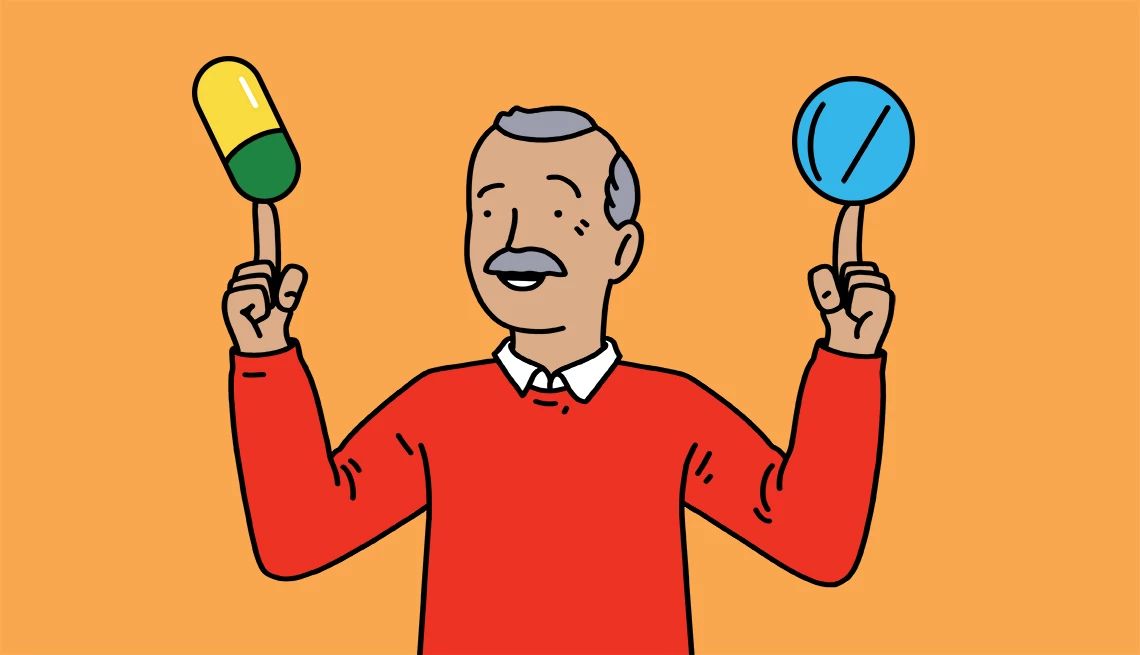
25 great ways to manage your medications | members only
- Select a language for the TTS:
- UK English Female
- UK English Male
- US English Female
- US English Male
- Australian Female
- Australian Male
- Language selected: (auto detect) - EN
Play all audios:

9. STORE MEDICATIONS PROPERLY The United States Pharmacopoeia (USP) recommends that medication storage temperatures should be maintained between 59 degrees Fahrenheit to 86 degrees
Fahrenheit — so in the steamy bathroom, on a sunny windowsill or by the hot stove are not ideal locations to store your pill bottles. Rasaki says it’s important to store your medications at
the right temperature because it helps avoid ingesting damaged medication. Humidity is another important factor. According to the World Health Organization, medications should not be stored
in conditions where the humidity exceeds 60 percent. Additionally, Rasaki says it’s also important to store medications in their original container, as changing the bottle could result in
you forgetting which medication it is. When traveling, don't keep medications in your checked luggage — always carry them with you. Sam Island 10. TRAVEL SMART When traveling with
medication, Rolando R. Maldonado, M.D., a physician at Midtown Family Medicine in Houston, shares a couple of rules to live by: First, always carry the medications with you (in your purse,
backpack or carry-on bag) and never check them — airlines lose luggage every day. And second, always take extra doses in case your vacation runs longer than expected, or some pills get
stolen or misplaced. Note: These tips are especially important if you’re traveling solo. 11. CONSIDER USING A MEDICATION-MANAGEMENT SERVICE Have a lot of medications to keep straight? A
medication-management service (MMS) can review your drug regimen and assist you with developing a schedule. “These services can help prevent adverse drug events, lower drug costs and enhance
communication with your health care provider,” says Rasaki, who urges patients to talk to their doctor about what medication-management services are available for them. 12. NEVER SKIP
DOSAGES It can be tempting to skip doses of medicine due to the expense of refills, wanting the medication to last longer, or even if you’re feeling better. But skipping doses can lead to
severe complications, especially for heart disease and diabetic patients, Maldonado says. “It can lead to worse symptoms, worsening of the disease, ER and hospital admissions and even
death,” he says. Always follow the exact instructions printed on the medication label and consult your physician if you have concerns about doing so. 13. AVOID MIXING MEDICATIONS WITH
ALCOHOL According to the National Institute on Alcohol Abuse and Alcoholism, combining alcohol with certain medications — particularly those with sedative effects — can increase the risk of
adverse events, including falls, driving accidents and fatal overdoses. It goes on to report that people 65 and older are at particularly high risk for harm, due in part to age-related
changes in their physiology and their increasing use of medications that could interact with alcohol. Plus, Maldonado says it can interfere with the effectiveness and absorption of
medications. “I tell my patients to avoid drinking at least four to six hours after taking medication and to limit that amount of consumption,” he says. Common medications known to interact
negatively with alcohol include anti-anxiety drugs, antidepressants, sleep aids, opioids, anti-coagulants and antibiotics. 14. KEEP TRACK OF REFILLS Keeping track of when to order refills
can be challenging — many refill policies allow you to refill or renew a prescription medication when 25 percent to 35 percent of your current prescription is left — and picking them up can
be a hassle, too. “This is especially harder with seniors who live alone or may have no family members to help them,” Maldonado says. “Seniors often need to buy medications from multiple
sources to get the best price, which makes it even harder to get medications if they are getting some mailed, and others at different pharmacies.” He says companies like PillPack (by Amazon)
can help by delivering automatic refills right to your door, and it accepts most insurance plans. Other options include Nimble and Express Scripts. Prescription medications can sometimes
benefit from adjustments. Be honest with your doctor during regular visits on how you're responding to the treatment. Sam Island 15. FOLLOW UP WITH YOUR DOCTOR FOR ADJUSTMENTS Seniors
should visit their doctors regularly, as prescription medications sometimes need adjustments. “This could be due to changes in their health, how they respond to treatment, or the development
of new medical issues,” Patel says, adding that these visits provide an opportunity to review medications and make modifications to enhance treatment outcomes. Aim to schedule regular
checkups every few months and bring an updated list of all medications, including OTC drugs and vitamins. 16. WEAR A MEDICAL ID BRACELET OR ADD IT TO YOUR SMARTPHONE Maldonado says
medical ID bracelets are important because they help quickly identify people with specific medical conditions in emergencies. This is especially true for insulin-dependent diabetics, heart
conditions, seizure disorders, allergies to medications and dementia patients who may wander off. You can also set up a medical ID on your smartphone, which allows first responders to access
it without your passcode. 17. DON’T TAKE EXPIRED MEDICATION All medications have an expiration date, and they’re listed on the bottle for a reason. “Old or unused medicines can lose their
potency and effectiveness, potentially posing risks to health,” Patel says. Plus, according to the U.S. Food & Drug Administration, “certain expired medications are at risk of bacterial
growth and sub-potent antibiotics can fail to treat infections, leading to more serious illnesses and antibiotic resistance.”
